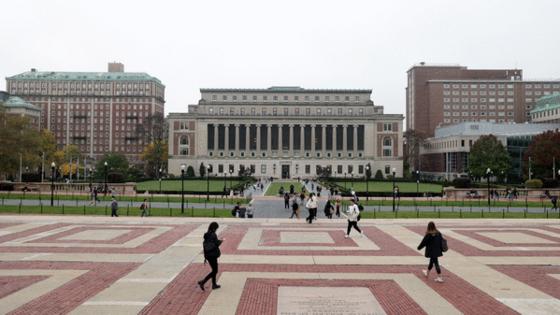Columbia University to aid Trump policing of foreign students under deal
Published in News & Features
WASHINGTON — Beyond the $221 million that Columbia University will pay as part of its settlement with the White House, the school also accepted new requirements that threaten to sour its relationship with a crucial source of talent and revenue: foreign students.
Under the terms of last week’s agreement, Columbia will take on new duties to help the government police international students, said a university official with knowledge of the deal’s repercussions. That includes reporting even minor offenses such as trespassing – a common charge for student protesters – that previously were resolved without involving federal authorities.
The changes highlight the stepped-up scrutiny foreign students will face, as well as the increased administrative burden the Ivy League school has shouldered to reclaim its federal funding. Columbia also agreed to take steps to reduce its financial dependence on foreign students, share more information on its student-visa holders and review its international admissions process.
International students are already uncertain about their future, with worries spurred by immigration detentions on campus and U.S. officials’ attempts to revoke student visas — a campaign that, began at Columbia and spread nationwide. The new measures are poised to bring more potentially unsettling changes to a school where almost 40% of students are from outside the U.S.
“That’s one of the most significant changes in this,” said Chris Glass, a professor at Boston College’s Center for International Higher Education, referring to Columbia’s settlement. “It puts the university in an unprecedented and precarious position of being an institution that guards intellectual freedom but also has obligated itself to fulfill reporting responsibilities to the federal government.”
In a statement Friday, Columbia confirmed it will report arrest information to the Student and Exchange Visitor Information System, or SEVIS, which all colleges that enroll foreign students must participate in.
“As part of the university’s long-standing obligations as a participant in SEVIS, certain student information is required to be provided to the program, including disciplinary actions that result in expulsions or suspensions,” the university said. “In addition to those long-standing requirements, Columbia will now also notify the program if it is made aware of arrest information.”
Reportable offenses will include infractions such as trespassing, the charge on which 78 students were arrested in May after they occupied a university library in a pro-Palestinian demonstration.
“This is all in the context of the pro-Palestine protests,” Glass said. “This is a new role the government wants universities to play.”
The stepped-up scrutiny is eliciting outside warnings about Columbia’s ability to continue enticing foreign applicants.
“International students and their parents were already hesitant about studying at U.S. colleges, and we’re not the only game in town anymore. The U.K., Australia – there are many alternatives,” said William Brustein, a veteran international-student officer who’s worked at large research universities. “This just adds more fuel to that fire.”
Fanta Aw, executive director of NAFSA, an association of international student officers and recruiters, said the arrest and disciplinary reporting requirement was something typically “outside of the jurisdiction of universities.” The Columbia deal “sets a precedent that all institutions should be aware of,” she said.
In a letter to Columbia students and staff last week, Acting President Claire Shipman said a key reason she was eager to reach an agreement with President Donald Trump was “the potential revocation of visa status of thousands of international students.” She also said Columbia didn’t agree to report any information to which the federal government isn’t already legally entitled.
Arrest records are already accessible to Immigration and Customs Enforcement officials, and U.S. agents used criminal records in their efforts to revoke student visas earlier this year.
But Columbia hasn’t typically been required to keep track of those records. Nor has it been obliged to report infractions to the government unless they result in a suspension or expulsion that affects students’ enrollment requirements, and in turn, their visa status.
The New York City-based school currently enrolls more international students than all but two other universities in the U.S., according to data from the Institute of International Education. Since many of them pay full tuition, they’re a pillar of Columbia’s revenue.
Its graduate programs are particularly dependent on applicants from overseas. Other Ivy League schools are similarly reliant on international students to fill their graduate programs, especially in research fields focused on science, technology, engineering and math.
While Shipman said the agreement would have no direct bearing on Columbia’s admissions process, the concessions echo steps taken by the Trump administration to heighten scrutiny of international applicants, including a new State Department policy for reviewing visa applicants’ social media.
In May, Secretary of State Marco Rubio said the administration would “aggressively revoke” Chinese students’ visas over national security concerns.
In July, the Department of Justice opened an investigation into the University of Chicago’s admissions policies for international students.
Last week, the State Department launched a probe into Harvard’s compliance with federal regulations around a program for foreign researchers and visitors, months after Trump tried to ban foreign students and scholars from the school.
It’s not clear whether other schools in settlement talks with the administration will agree to the same measures on international students that Columbia did. Brown University reached a deal with the Trump administration Wednesday that didn’t include such provisions.
But policies on foreign students are almost certainly on the table in those talks. Stephen Yale-Loehr, a former immigration law professor recently retired from Cornell University, said that for Columbia and other schools entertaining such concessions, “the devil is in the implementation details.”
But “no matter how this is implemented,” he said, “it shows international students that Columbia — and other universities that accept similar language — will be less welcoming.”
©2025 Bloomberg L.P. Visit bloomberg.com. Distributed by Tribune Content Agency, LLC.







Comments